|
|
|
Sort Order |
|
|
|
Items / Page
|
|
|
|
|
|
|
| Srl | Item |
| 1 |
ID:
155059
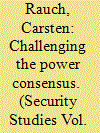

|
|
|
|
|
| Summary/Abstract |
Power Transition Theory (PTT) has hitherto often relied on power indicators like Gross Domestic Product (GDP) or the Composite Index of National Capability (CINC) to capture its power variable. The underlying assumption is that these indicators are highly correlated, and thus it matters little as to which one the researcher chooses. I call this PTT's power consensus and argue that this consensus is problematic, as the choice of power indicator is often crucial. For PTT, it does not only matter whether such indicators come to similar results by and large; the position of certain singular actors—such as the dominant power, its prime challengers, and the top ranked great powers generally—is even more essential. However, it is precisely with regard to the positions of these actors that we find important discrepancies between what PTT's favored indicators (GDP and CINC) suggest. Analysis of some crucial historical and recent cases supports my challenge to the power consensus. First, the celebrated peaceful power transition between the United Kingdom and the United States in the nineteenth century becomes suspect under closer scrutiny, as GDP places the United States entering the parity zone at a time during which it must arguably be counted as a dissatisfied power. Second, a number of CINC-exclusive power transitions in the twentieth century are not accounted for by GDP. A few possible options might mitigate the power-problem for the cases under scrutiny, however scholars of PTT should generally be much more conscious about their choice of power indicator.
|
|
|
|
|
|
|
|
|
|
|
|
|
|
|
|
| 2 |
ID:
175321
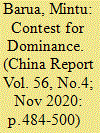

|
|
|
|
|
| Summary/Abstract |
There is an ongoing debate whether China is a satisfied power or a dissatisfied revisionist power. On the basis of the concept of regime insecurity and power transition theory, this article argues that the resolution of this debate mainly depends on some essentially interrelated complex factors—China’s assertive behaviour, China’s core interests, China’s internal security, and China’s involvement in territorial disputes. Moreover, this article examines the validity of the usual claim of power transition theory that the dominant power is always satisfied with the status quo, and contrary to this idea of power transition theory, this article suggests that the dominant power can be dissatisfied and revisionist too if its hegemony is under threat.
|
|
|
|
|
|
|
|
|
|
|
|
|
|
|
|
| 3 |
ID:
099892
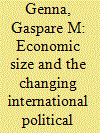

|
|
|
|
|
| Publication |
2010.
|
| Summary/Abstract |
Why are some free trade agreements (FTAs) in the western hemisphere successfully negotiated and implemented while others seem to stagnate during negotiations? FTAs are more likely to develop when there is an asymmetrical power relationship and potential partners are satisfied with projected trade patterns. The European Union (EU) and United States have been successful in negotiating agreements with the Caribbean and Central American (CCA) countries. However, current bilateral and multilateral trade talks between the EU, the Common Market of the South (MERCOSUR), and United States are at a standstill. Although all four sets of trade negotiations include dissatisfactory conditions for the Latin American countries, the two negotiations with the CCA countries were successful completed, but the two involving MERCOSUR countries have not. These results are partially due to two factors: the economic size differential between the CCA countries and MERCOSUR vis-à-vis the EU and United States, and MERCOSUR's growing economic ties with China. MERCOSUR's medium-size economy and ties with China allows it to forgo FTAs with the EU and United States until more favorable conditions are met. However the CCA countries' immensely smaller size and economic ties with China do not allow for such abstention.
|
|
|
|
|
|
|
|
|
|
|
|
|
|
|
|
| 4 |
ID:
112751
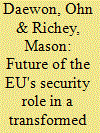

|
|
|
|
|
| Publication |
2012.
|
| Summary/Abstract |
A fundamentally new security landscape is unfolding in East Asia due to the
changing power structure among the great powers, particularly owing to the fast
rise of China and the relative decline of the United States. This paper analyzes the
dynamics of power transition in East Asia and assesses the possibility of the EU
playing a meaningful role in the strengthening of security governance in the
region. It begins by arguing that although the East Asian region is entering a
transformation stage it will not likely lead to a major collision between the United
States and China. This means the EU will have opportunities to become involved
in East Asian security affairs, provided it further strengthens its multi-faceted,
comprehensive engagement policies vis-à-vis the region. We focus particularly
on the EU's ability to promote the positive aspects of East Asian regionalism via
deepened and expanded cooperative measures such as bilateral and multilateral
framework agreements with regional countries and organizations. In addition to
offering a reliable model for regional security governance, the EU will be able to
contribute to regional security by cooperating with the United States and other
East Asian countries and organizations in selected security issues, such as sea-lane
protection, counter-terrorism, non-proliferation of Weapons of Mass Destruction
(WMD), humanitarian operations, etc. Internally, we show that after the Treaty of
Lisbon the EU is approaching incrementally a position wherein it can make
greater CFSP/CSDP engagements-particularly those associated with peacekeeping/
peacemaking and humanitarian operations-in the wider world including East
Asia.
|
|
|
|
|
|
|
|
|
|
|
|
|
|
|
|
| 5 |
ID:
165260


|
|
|
|
|
| Summary/Abstract |
How can declining states reliably infer the intentions of rising states? One prominent line of argument maintains that because declining states face intractable uncertainty about rising states’ future intentions, preventive war is often unavoidable even between states with truly compatible goals. This article presents a dynamic model of reassurance in which actors are uncertain whether or not their interests conflict. The model shows that by adopting a hedging strategy of limited containment short of war, declining states can reduce risers’ incentives to send dishonest cooperative signals. This, in turn, makes cooperation more credible as a signal of risers’ benign intentions. Moreover, these signals are sufficiently informative to dissuade the decliner from escalating to preventive war even under large power shifts. Thus, although power shifts promote limited competition among states with compatible goals, preventive war rationally occurs only in a bargaining context when the riser’s goals are known to be incompatible.
|
|
|
|
|
|
|
|
|
|
|
|
|
|
|
|
| 6 |
ID:
137455
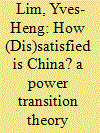

|
|
|
|
|
| Summary/Abstract |
The uninterrupted rise of China, concomitant with the progressive erosion of the US unipolar moment, has generated increased interest for the (Power Transition Theory) PTT in the last decade. Observers and scholars have, however, often focused on the possible overtaking of the United States by China, and overlooked the importance of the challenger's ‘satisfaction’ in the PTT. This article fills this gap by providing an assessment of China's satisfaction with the contemporary East Asian ‘status quo’. Contrary to recent assessments depicting China as a ‘status quo’ actor, the use of the main three indicators developed by the PTT suggests that China is a strongly dissatisfied power.
|
|
|
|
|
|
|
|
|
|
|
|
|
|
|
|
| 7 |
ID:
111747
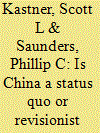

|
|
|
|
|
| Publication |
2012.
|
| Summary/Abstract |
China's rising power and increased global activism have attracted increasing attention, with particular focus on whether a stronger China is likely to be a revisionist or status quo state. Power transition theory highlights the potential for a dissatisfied rising power to challenge the existing international order, but it is difficult to evaluate whether a rising power is dissatisfied. Where Chinese leaders choose to travel can offer insights into whether China's behavior is more consistent with that of a revisionist or status quo state and into China's broader diplomatic priorities. We present a series of expectations concerning how the travel patterns of a challenger state are likely to differ from the travel patterns of a status quo state. Using a newly compiled data set, we then analyze the correlates of travel abroad by top Chinese leaders from 1998 to 2008. Our results are more consistent with a status quo conceptualization of China, though there are some important exceptions such as willingness to travel to rogue states. We also use travel data to test other hypotheses about Chinese foreign policy behavior.
|
|
|
|
|
|
|
|
|
|
|
|
|
|
|
|
| 8 |
ID:
108183


|
|
|
| 9 |
ID:
186127


|
|
|
|
|
| Summary/Abstract |
Situated at the crossroads of the Silk Road, Central Asia has been an arena of international competition for centuries. Today, a “New Great Game” appears to be taking place between Russia, China and, to a lesser extent, the United States and the European Union for regional hegemony. In the last two decades, Russia and China formed an “axis of convenience”, both to counter Western influence and to thwart regional challenges; however, this has increasingly turned to rivalry in recent years, with China gradually replacing Russia as the chief power with regard to geo-economic and energy assets in some Central Asian countries. An analysis based on Power Transition Theory points to two possible future scenarios for the rivalry, namely China’s predominance or a Chinese-Russian modus vivendi based on a ‘division of labour’.
|
|
|
|
|
|
|
|
|
|
|
|
|
|
|
|
| 10 |
ID:
124277
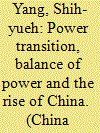

|
|
|
|
|
| Publication |
2013.
|
| Summary/Abstract |
The rise of China is a major theme in international relations for both scholars and statesmen. Based on existing theories, namely the power transition theory and the balance of power theory, China's rise is forecasted to be violent, either by challenging the existing hegemon or by inviting counterbalancing efforts. Nonetheless, these arguments are highly controversial and lead to a neglect of theorization about rising great powers. Therefore, this article attempts to revisit and revive the theoretical discussions and present a refined theory of rising great powers that can explain the past and illuminate the future. to provide a clear picture of capabilities, the refined theory exclusively focuses on material variables. The theory demonstrates that the different material contexts in which great powers rise explain the differences in their external behaviors and how they are treated by existing great powers.
|
|
|
|
|
|
|
|
|
|
|
|
|
|
|
|
| 11 |
ID:
138098
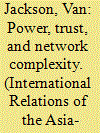

|
|
|
|
|
| Summary/Abstract |
Why do hedging strategies appear so pervasive in Asia? This article argues that hedging – not balancing or bandwagoning – is the central tendency in Asian international relations, offering three different lenses for making sense of this phenomenon, focusing in particular on the third: power transition theory, mistrust under multipolarity, and complex networks. Each perspective highlights different factors that explain the incentives for Asian states to hedge, what hedging looks like, and how long hedging is likely to endure. Power transition theory tells us that hedging is the result of uncertainty about a possible power transition between the United States and China. Multipolarity points us to uncertainty about the intentions of a growing number of states. And the logic of complex networks explains hedging as a response to the topology of Asia’s complex network structure – consisting of sensitivity, fluidity, and heterarchy – which makes it difficult for Asian-foreign policy elites to assess the future consequences of present day commitments.
|
|
|
|
|
|
|
|
|
|
|
|
|
|
|
|
| 12 |
ID:
161603


|
|
|
|
|
| Summary/Abstract |
Power transition theory (PTT) has had a progressive research program for more than half a century. In spite of this, one of its key concepts, satisfaction, has remained undertheorized. A compelling theory explaining why growth would make some states dissatisfied in the context of power transitions and others satisfied has not been articulated. It is argued here that satisfaction must be theorized at two levels of analysis: the global and the dyadic. The key to distinguishing satisfied versus dissatisfied states at the global level lies in specifically differentiating between the structural effects of changing power and the satisfying effect of increasing wealth. At the dyadic level, conflict over territory creates a perfect storm of state dissatisfaction. The study develops a theoretical framework for a multilevel understanding of satisfaction and its impact and tests it across politically relevant dyads from 1950 to 2001. The evidence strongly supports the hypotheses.
|
|
|
|
|
|
|
|
|
|
|
|
|
|
|
|
| 13 |
ID:
131270
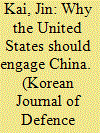

|
|
|
|
|
|
|
|